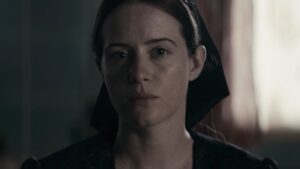Upon seeing the costumes in “Women Talking,” I assumed that it was a period piece, perhaps set sometime in the 19th century. Then I learned that it was set in 2010, I was shocked — and intrigued.
“Women Talking” centers around an isolated Mennonite community that has had a series of violent sexual attacks come to light. When the menfolk of the community leave to bail out a man in jail, it gives the women time to come together to process the brutality done to them and discuss what their options are: do nothing, stay and fight or leave. Most of the movie’s scenes take place in a barn where a group of ten women — mothers, grandmothers and daughters — come together to figure out their future.
It would be easy for a movie primarily centered around talking to feel static, but a strong script and great acting performances keep it dynamic and natural. Though it can feel rather staged at times, and the dialogue can feel somewhat deliberately constructed for rhetorical flourishes, it doesn’t prevent the viewer from being drawn into the difficult but spirited debate of these women. The film’s soundtrack, composed by Hildur Guðnadóttir, emphasizes the difficult plot, with darkness and sorrow but also hope appearing in different variations. In the stark and bare setting of the film, the soundtrack helps establish much of the tension.

In an ensemble as huge and excellent as this, it’s hard to single out one performance. Claire Foy stands out as Salome, who fights her assailant and wants to deal out a couple more blows. She’s had enough of standing down and is ready to let her anger out. In contrast, Ona (Rooney Mara) projects a serenity at odds with the violence of her circumstances. Mariche (Jessie Buckley) projects her character’s false front loudly as if it is her own while letting the grief and anger of her trauma play out more subtly. Sheila McCarthy and Judith Ivey also stand out as the wise elders of the group, deftly conveying a struggle between the ultraconservative leanings of the life they know with the guilt of what was done to their daughters. Foy, Mara and all the other members of this huge ensemble play off of each other wonderfully and breathe life and hurt into these women.
The movie was based on Miriam Toews’ novel of the same, which in turn was inspired by the true events that occurred in a Mennonite community in Argentina. Following years of sexual assault going unnoticed, eight men were arrested, with over a hundred women testifying against them. The youngest victim was only nine years old. Despite addressing a true story, both the movie and book choose to not reference any of the real women involved. There is also purposefully no mention of the setting, as if to hammer home that this could happen anywhere. In this, Polley manages to make the themes of the movie feel universal.
Verdict: “Women Talking” is a stunning drama held together by an excellent script and bold acting performances. It might not entertain you, but it will make you think long and hard about the contemporary attitudes about sexual assault, and how far we still have to go.







